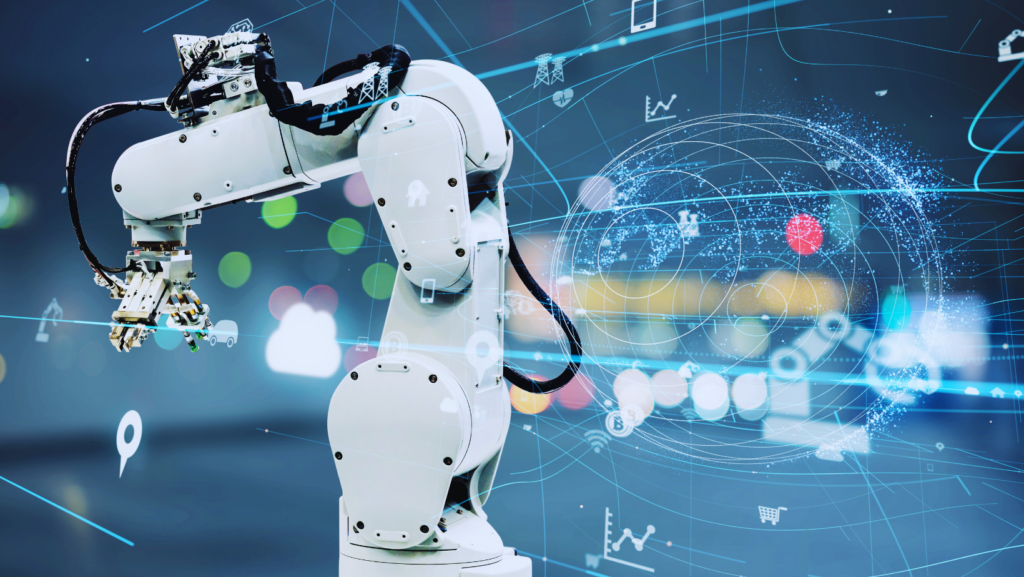Industry 4.0, also known as the fourth industrial revolution, is a term that captures the sweeping digital transformations in industrial processes. This blog serves as the first part of our Industry 4.0 Series, where we delve into what Industry 4.0 is and explore the technologies that drive this transformative revolution This shift is powered by advanced technologies like automation, data exchange, and artificial intelligence (AI), creating smarter, more connected, and efficient industrial processes. This novel stage places a significant emphasis on seamless interconnectivity, advanced automation, the application of machine learning, and the utilization of real-time data.
What is Industry 4.0?
Industry 4.0 is characterized by the use of automation and advanced data analytics, allowing for smart manufacturing and the creation of intelligent factories. The objective is to boost productivity, streamline efficiency, and increase adaptability, all while facilitating smarter decision-making and personalization in the operations of manufacturing and supply chains.
This transformation is not just about technology; it’s also about how businesses respond to changing market conditions. The COVID-19 pandemic has underscored the need for digital transformation. McKinsey found that the pandemic has dramatically accelerated the pace at which digital is fundamentally changing business. McKinsey’s study conducted in 2021 revealed a significant increase of 65% in the funding of digital and technology-based initiatives. Six months into the global health crisis, a survey by McKinsey found that 94% of participants affirmed that Industry 4.0 technologies had been instrumental in maintaining their business operations. Moreover, 56% deemed these technologies as vital components in responding to the crisis.
Understanding the Technologies Involved
Industry 4.0 is underpinned by four pivotal disruptive technologies, as identified by McKinsey, each having a significant impact on the value chain:
- Connectivity, Data, Computational Power: This category encompasses sensors, IoT, cloud technology and blockchain. Cloud Computing provides services like data storage, security, networking, software applications, and business intelligence over the internet based on a subscription model. These technologies form the backbone for transmitting large volumes of data swiftly, securely, and reliably. The Internet of Things (IoT) comprises devices equipped with sensors, software, and other technologies that gather and scrutinize data, thus providing real-time insights into the manufacturing process. A majority of physical components in Industry 4.0 – ranging from devices, robots, machinery, to equipment and products – employ sensors and RFID tags to relay real-time data about their status, functioning, or location.
- Human-Machine Interaction: This involves technologies like virtual reality (VR), augmented reality (AR), robotics, automation, cobots, and chatbots. These technologies bolster human capabilities, enhance decision-making processes, and boost operational efficiency. Smart manufacturing technologies leverage real-time data and data-driven technologies such as AI and IIoT to automatically adjust to shifts in customer demand and business requirements.
- Analytics and Intelligence: This category includes advanced analytics, machine learning, and AI. These technologies facilitate predictive maintenance, improve operational efficiency, and forge new business models. Big data pertains to the processing of enormous volumes of data to guide decision-making, predict trends, and streamline operations. It’s an integral part of Industry 4.0, enabling businesses to derive insights from extensive datasets generated from diverse sources. AI uses algorithms that learn from data, forecast outcomes, and autonomously enhance operations.
- Advanced Engineering: This involves additive manufacturing (3-D printing), renewable energy, and nanoparticles. These technologies enable the creation of highly customized products, reduce waste, and improve sustainability. Additive manufacturing allows for the production of complex geometries and structures that are not possible with traditional manufacturing methods. Renewable energy technologies contribute to greener and more sustainable industrial processes. Nanoparticles have potential applications in areas such as materials science, physics, and biology.
We recognize that the journey towards Industry 4.0 can be daunting and fraught with complexities. But remember, you are not alone in this transition. MTEC is here to guide and support you every step of the way. If you require additional assistance or are interested in applying for the NYS Industry 4.0 Advancing Manufacturing Initiative, don’t hesitate to reach out to MTEC. We are committed to helping you navigate this transformative era in manufacturing.
To discuss Industry 4.0 further and explore how MTEC can support your business, please contact our Director of Operations, Phyllis Levine, at (845)391-8214 Ext. 3001 or via email at phyllis.levine@hvtdc.org to arrange a complimentary visit.
